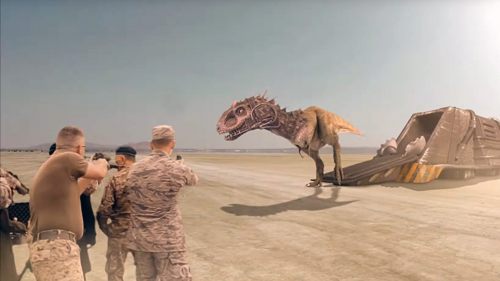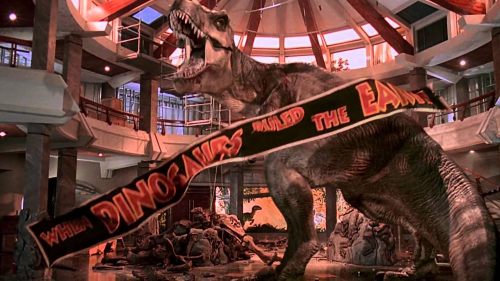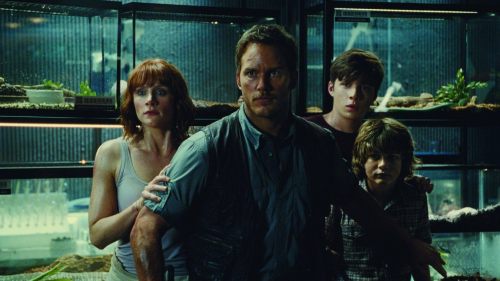JURASSIC WORLD EVOLUTION Game Review: Your Park Is Open
Jurassic World: Fallen Kingdom is out now, and as with many major blockbusters, that means video-game tie-ins inevitably come along for the ride. Licensed games run the gamut from some of the medium’s worst material to some of its best, and sadly most Jurassic games have tended to fall at the unfortunate end of that spectrum.
Luckily, though, Frontier Developments’ (Planet Coaster, Elite Dangerous) Jurassic World Evolution is a surprisingly in-depth park simulator and a beautiful, lovingly-rendered tribute to the Jurassic Park franchise. There’s no doubt the developers on this game were fans of the films - fans who, remarkably, managed to replicate the series’ themes, visuals, and even tone in a freaking park-management game.
Jurassic World Evolution puts players in charge of their very own dinosaur park, modeled on the designs of the completed park in Jurassic World. Its beautiful, lush greenery and slick UI ooze authenticity and style both close-up and at a distance, but it's the gameplay systems that really engage. As you'd expect, you've got all the problems of a major theme park and a major zoo, and you've got to manage them all. You'll have to balance researching, cloning, and caring for dinosaurs; building enclosures, laboratories, and support buildings; and making sure the public remains interested, safe, and spending money. Sometimes you’ll need to send paleontologists to dig sites to collect DNA. Sometimes you’ll need to breed more complex hybrids to impress the public. Sometimes you’ll just need to build more goddamn fast-food joints. Everything you do contributes toward your island's rating and income, and in turn, your progression through the game.
The most important aspect of any Jurassic game is, naturally, the dinosaurs, and Evolution boasts the best dinosaurs of any game in the franchise. From your starter animal Struthiomimus, to favourites like Triceratops, Stegosaurus, T-Rex and velociraptors, to weirder and lesser-known beasts, each animal is designed with care and authenticity to the movies, if not to current science. As the music swells, quoting John Williams or expanding on his musical ideas, it’s hard not to get caught up in wonder the first time you successfully incubate a certain dinosaur. Frontier put a lot of work into designing the animation and AI behaviour for Evolution’s dinosaurs, and it pays off. These creatures have wants and needs, and it’s important to meet them. It’s only when your park gets super-complex that it becomes truly difficult to stay on top of things, but until then, it’s a pleasure to take care of your lil’ friends. It’s entirely possible to just watch your dinos romp around, socialise, feed (yes, he's gonna eat the goat), and fight amongst each other.
Guiding you through your play are a collection of characters both new to the game and returning from the movies. Ian Malcolm (the real Jeff Goldblum!) offers cynical warnings, Henry Wu (the real BD Wong!) plays his weird new villain role, and Claire Dearing (the real Bryce Dallas Howard!) offers welfare tips, while Owen Grady (a fake Chris Pratt!) delivers bizarre stories from his time dealing with dinos.

The new characters serve as quest-givers and tutors in the ways of Jurassic Park management. Your PR manager coaches you to make money and find success however you might find it, but you’ll mostly deal with three factions: Science, Entertainment, and Security. Missions from each division will improve your standing with one, but decrease your standing with the others, while earning you money and often unlocking new dinosaurs, dig sites, buildings, and upgrades. So there’s an element of strategic play in keeping everyone happy while also getting the unlocks you want.
Player progression in Evolution is reflected in income, efficiency ratings, and more importantly in what you can add to your park. You'll start out with plain steel fences, but later graduate to thicker, stronger, and more electrified enclosures. Your operations buildings can be upgraded to become more efficient and reliable. And for the tourists, basic attractions like viewing platforms and gift shops give way to hotels, monorails, gyrospheres, and bowling alleys. In a mark against true Jurassic World authenticity, there's no option Jamba Juice or Margaritaville option, but you always can build a bar and rename it if you want.
As you play through Jurassic World Evolution, you’ll gradually unlock more islands - starting with the “Five Deaths” of which The Lost World’s Isla Sorna is but one. Each of the Cinco Muertes presents different challenges - one is wracked by storms, another features pre-existing but destroyed infrastructure - and encourages different styles of play. They’re actually completely separate campaigns, and don’t affect each other apart from in the unlocking of new buildings and dinosaurs - which means you can play one island without worrying about screwing up another one. Best of all, Isla Nublar (aka: the original island) functions as a sandbox mode, with no restrictions on budget, allowing players to create the park - or disaster - of their dreams.
This wouldn't be a Jurassic Park game without things going wrong, and thankfully Evolution strikes a pretty enjoyable balance between chaos and order. Dinosaurs can get sick, hungry, or unhappy, depending on how you attend to their needs (or don't), and they can and will break out of their enclosures, if they don't all die of the common cold first. Sometimes they're aided by storm damage to buildings. Sometimes the power goes out. If you don't satisfy the in-game factions, you might even find human beings sabotaging your facilities. It's up to you to assign ranger teams to feed, treat, or tranquilise your ailing or rampaging dinosaurs - or do it yourself by driving jeeps, flying helicopters, and firing the darts yourself. Then, you'll have to pay out for injury lawsuits. Damage control is a key part of running a dinosaur park, after all.
That's if you want to control the damage, of course. The temptation to let your dinosaurs run rampant is extremely real, and the sound effects and animations associated with the carnage are extremely satisfying. As amusing as it is to see your tiny park attendees take selfies with dinosaurs, it's even better to watch them flee in terror. Or, you know, you can open emergency shelters for people to hide in. If you want to. Not only does the chaotic side of Evolution mirror the series’ cautions over playing God; it reflects the films’ tension between wonder, horror, and more recently, gleeful cruelty.
My chief criticism of Jurassic World Evolution is mostly a comparison to Frontier’s previous title Planet Coaster, and I'll be honest: it's an unfair one. Coaster enabled players an astonishing degree of creativity in designing their amusement parks - to the extent that someone recreated the entirety of Aliens in a single rollercoaster - and that latitude for original thought just isn’t there in Evolution. That’s understandable, to a degree - the developers were bound by the restrictions of their license, after all - it just means the game eventually reaches a point where the only way you can express yourself is in what spanners you throw in the works. Or, I guess, how many dicks you want to draw with your monorail tracks.
As a Jurassic Park-themed sandbox, though, Jurassic World Evolution is top-tier stuff. Fans of the series will be well-pleased, and players looking for a deep simulation game will get that too. It’s a rare Jurassic Park game that’s actually worth playing - although as with many simulators, the fun only truly begins when things go haywire.



